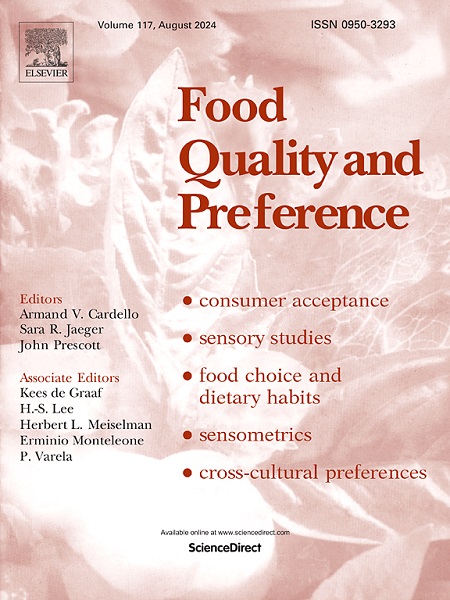用扩展的计划行为理论方法评估影响菲律宾街头食品消费的因素
IF 4.9
1区 农林科学
Q1 FOOD SCIENCE & TECHNOLOGY
引用次数: 0
摘要
近来,食品消费行为方面的变化十分普遍,尤其是街头食品在不同国家的流行。由于文献资料稀缺,有关街头食品消费和行为意向的研究显而易见。本研究采用扩展的计划行为理论框架,对街头食品的消费意向进行整体评估。通过在菲律宾收集到的 1601 份有效问卷,应用结构方程模型对影响菲律宾街头食品消费意向的因素进行了因果关系分析。结果表明,感知到的食品质量和功利性饮食价值观是影响态度的促成因素,而功利性饮食价值观对消费意向的影响β值高于享乐性饮食价值观和消费者行为领域。其次是金钱感知、主观规范和行为控制感知以及消费者态度。同时,享乐饮食价值与消费意向呈负相关,但与消费者态度呈正相关。研究还为其他研究人员提供了管理启示、实用建议和详尽讨论,以便在研究结果的基础上扩展到与本地到国外的食品和饮料广告、销售和推广相关的其他方面。此外,本研究中使用的结果和框架还可进一步扩展并应用于与其他食品行业相关的消费者行为的其他方面。本文章由计算机程序翻译,如有差异,请以英文原文为准。
An extended theory of planned behavior approach for assessing factors affecting street food consumption in the Philippines
Changes in behavioral aspect in food consumption prevailed in recent times, especially the rise of street food popularity in different countries. With scarce literature available, research on consumption and behavioral intentions in street foods was evident. This study considered an extended theory of planned behavior framework for the holistic assessment of consumption intention of street foods. With 1601 valid responses collected in the Philippines, structural equation modelling was applied for the causal relationship analysis of factors influencing consumption intention of street foods in the Philippines. Results indicated that perceived food quality and utilitarian eating values presented as contributing factor affecting attitude, while utilitarian eating values affected consumption intention with higher beta value over hedonic eating values and consumer behavioral domains. Following which was perceived monetary aspects, subjective norm and perceived behavioral control, and consumer attitude. Meanwhile, hedonic eating value negatively associated with consumption intention, but positive on consumers’ attitude. Managerial implications, practical suggestions, and thorough discussion were presented for other researchers to build on the findings which can be extended into other aspects related to local to foreign food and beverage advertisement, selling, and advancement. Furthermore, the results and framework utilized in this study can be further extended and applied to other aspects of consumer behavior in relation to other food industries.
求助全文
通过发布文献求助,成功后即可免费获取论文全文。
去求助
来源期刊

Food Quality and Preference
工程技术-食品科技
CiteScore
10.40
自引率
15.10%
发文量
263
审稿时长
38 days
期刊介绍:
Food Quality and Preference is a journal devoted to sensory, consumer and behavioural research in food and non-food products. It publishes original research, critical reviews, and short communications in sensory and consumer science, and sensometrics. In addition, the journal publishes special invited issues on important timely topics and from relevant conferences. These are aimed at bridging the gap between research and application, bringing together authors and readers in consumer and market research, sensory science, sensometrics and sensory evaluation, nutrition and food choice, as well as food research, product development and sensory quality assurance. Submissions to Food Quality and Preference are limited to papers that include some form of human measurement; papers that are limited to physical/chemical measures or the routine application of sensory, consumer or econometric analysis will not be considered unless they specifically make a novel scientific contribution in line with the journal''s coverage as outlined below.
 求助内容:
求助内容: 应助结果提醒方式:
应助结果提醒方式:


